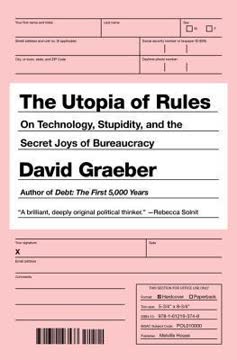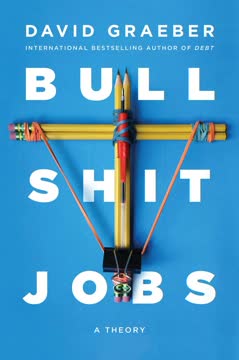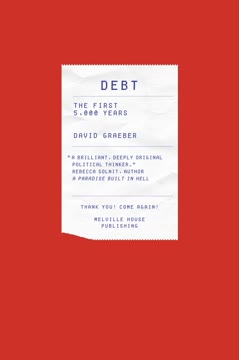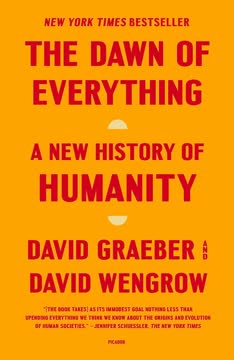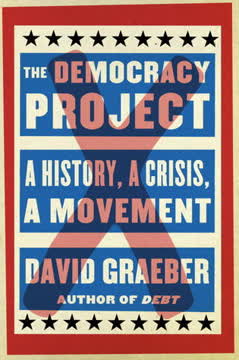Key Takeaways
1. The Unseen Explosion of Bureaucracy
We no longer like to think about bureaucracy, yet it informs every aspect of our existence.
Pervasive presence. Despite a decline in public discussion about "bureaucracy" since the 1970s, its actual presence in our lives has dramatically increased. We are constantly filling out forms, navigating phone trees, and dealing with web interfaces, making bureaucracy the "water in which we swim." This silent expansion suggests a collective decision to ignore a defining feature of modern existence.
Historical paradox. Graphs show the word "bureaucracy" peaked in usage around 1973 and then declined, while the actual time spent on bureaucratic tasks has continued to climb. This divergence highlights a peculiar societal blindness, where the phenomenon becomes so ubiquitous it ceases to be a topic of explicit concern or critique. The shift is particularly evident in the late 20th century, affecting middle-class citizens and the less fortunate alike.
Political catastrophe. The mainstream Left, once a source of anti-bureaucratic sentiment, has largely abandoned this critique, often adopting watered-down versions of right-wing arguments or promoting "market solutions" that only exacerbate the problem. This political vacuum allows the Right to channel popular anger, leaving the Left struggling to offer appealing alternatives to the "nightmare fusion of the worst elements of bureaucracy and the worst elements of capitalism."
2. The Iron Law of Liberalism: More Markets, More Rules
The Iron Law of Liberalism states that any market reform, any government initiative intended to reduce red tape and promote market forces will have the ultimate effect of increasing the total number of regulations, the total amount of paperwork, and the total number of bureaucrats the government employs.
Counterintuitive outcome. Nineteenth-century liberalism promised a world where states would give way to markets, reducing the need for stuffy functionaries. However, history shows the opposite: maintaining a "free market economy" required a thousand times more paperwork than absolutist monarchies. This paradox is so consistent it can be considered a sociological law.
Historical evidence. Markets did not emerge autonomously from state authority; they were often created or supported by government policy, especially military operations. Modern central banking systems, for instance, were first established to finance wars. Thus, the idea of markets as independent of government is a historical fiction used to justify policies that invariably expand bureaucratic oversight.
Political rhetoric vs. reality. Politicians like Ronald Reagan popularized the idea that "government is the problem," yet policies of "deregulation" rarely reduce bureaucracy. Instead, they often mean "changing the regulatory structure in a way that I like," leading to more complex rules and forms, even if framed as promoting individual initiative. This allows for the expansion of bureaucratic control under the guise of market freedom.
3. The Blurring Lines: Public and Private Bureaucracy Fuse
The vast majority of the paperwork we do exists in just this sort of in-between zone—ostensibly private, but in fact entirely shaped by a government that provides the legal framework, underpins the rules with its courts and all of the elaborate mechanisms of enforcement that come with them, but—crucially—works closely with the private concerns to ensure that the results will guarantee a certain rate of private profit.
Total bureaucratization. The distinction between public and private bureaucracy has become increasingly meaningless. Corporate management adopted bureaucratic techniques in the late 19th century, and today, private firms operate under a dense web of regulations often co-created with government, ensuring private profit. This fusion marks an "age of total bureaucratization."
Financialization's role. The shift in corporate allegiances from workers to investors, beginning in the 1970s, led to the financialization of capitalism. This meant:
- Corporate management became more financialized.
- The financial sector became corporatized.
- Executive compensation tied to stock options.
- Stock buybacks diverted funds from R&D and wages.
This created a system where wealth extraction often comes from debt, engineered through public-private alliances.
Credentialism and debt. The explosion of credentialism in "advanced" economies, requiring degrees for jobs that don't need them, serves to funnel individuals into debt. This debt, enforced by the legal system, becomes a primary mechanism for corporate profit extraction. The system, while appearing rule-bound, often operates with arbitrary extractions, where financial firms pay "penalty fees" for fraud that are less than the profits gained, effectively legalizing their illicit activities.
4. Structural Stupidity: How Violence Creates Bureaucratic Blindness
To put it crudely: it is not so much that bureaucratic procedures are inherently stupid, or even that they tend to produce behavior that they themselves define as stupid—though they do do that—but rather, that they are invariably ways of managing social situations that are already stupid because they are founded on structural violence.
Violence's role in creating stupidity. Bureaucracies, even well-intentioned ones, often produce absurd and frustrating outcomes because they manage social situations rooted in structural violence. This violence, the pervasive threat of physical harm underpinning social inequality, allows the powerful to avoid "interpretive labor"—the effort to understand others' perspectives.
Lopsided imagination. Structural violence creates an imbalance where subordinates must constantly imagine the perspectives of those in power to survive, while the powerful remain largely oblivious. This "lopsided structure of imaginative identification" is evident in:
- Gender relations (women understanding men, but not vice-versa).
- Master-servant dynamics (servants knowing employers' families, but not vice-versa).
- Colonial regimes (officials maintaining "power without knowledge" of subjects).
Bureaucracy institutionalizes this blindness, turning the limited perspectives of the powerful into rigid rules.
Bureaucrats with weapons. Police are essentially "bureaucrats with weapons," primarily enforcing regulations rather than fighting violent crime. Their truncheons represent the point where administrative schema and coercive force converge, attacking those who challenge official interpretations. This makes bureaucratic power, when it resorts to violence, a form of "infantile stupidity," as it rejects the coordination of multiple perspectives.
5. The Stifled Future: Why Flying Cars Never Arrived
I am referring, of course, to the conspicuous absence, in 2015, of flying cars.
Broken promises. The mid-to-late 20th century promised a future of technological wonders—flying cars, teleportation, robot maids, Mars colonies—that largely failed to materialize. This unfulfilled promise creates a "secret shame" and a sense of betrayal, often dismissed as childish naiveté, but reflecting a genuine historical divergence from expected progress.
Postmodern displacement. The cultural sensibility of postmodernism, with its focus on simulation and the end of grand narratives, can be seen as a coping mechanism for this technological disappointment. Advances in information technology primarily enabled simulations rather than material breakthroughs, leading to a sense that "everything now was simulation, ironic repetition, fragmentation and pastiche."
Shift in R&D priorities. The slowdown in transformative technological innovation since the 1970s is not due to unrealistic expectations but a conscious shift in investment. Resources were reallocated from civilian projects like space exploration to military research and technologies of social control. This ensured that breakthroughs were less likely to challenge existing social and economic arrangements.
6. The Bureaucratization of Scientific Creativity
It is proverbial that original ideas are the kiss of death for a proposal; because they have not yet been proved to work.
Managerial stifling. Even in areas that received massive funding, like robotics or medicine, the anticipated breakthroughs did not occur. This is largely due to the bureaucratization of scientific research, where corporate management techniques have invaded academia and research institutes. The emphasis on competition, metrics, and "selling" ideas stifles genuine creativity.
Audit culture's impact. Universities, now dominated by administrative staff and corporate management techniques, prioritize paperwork and marketing over teaching and original research. This "audit culture" demands "transparency" through explicit rules and quantifiable outcomes, effectively turning subtle, nuanced procedures into rigid "board games." This environment actively discourages adventurous or quirky ideas, especially those without immediate, predictable results.
Erosion of open-source ethos. The traditional "open-source" nature of scholarly research, where findings and techniques were shared, has eroded due to the corporate ethos. Research results are increasingly treated as personal property, and academic publishers restrict access, further enclosing the "intellectual commons." This shift from convivial to market competition hinders collaborative innovation and the pursuit of truly novel ideas.
7. The Covert Appeal: Bureaucracy as a Utopia of Rules
Bureaucracy holds out at least the possibility of dealing with other human beings in ways that do not demand either party has to engage in all those complex and exhausting forms of interpretive labor described in the first essay in this book, where just as you can simply place your money on the counter and not have to worry about what the cashier thinks of how you’re dressed, you can also pull out your validated photo ID card without having to explain to the librarian why you are so keen to read about homoerotic themes in eighteenth century British verse.
Impersonality's allure. Despite widespread complaints, bureaucracy holds a covert appeal due to its impersonality and predictability. It offers a respite from the "complex and exhausting forms of interpretive labor" required in personal relationships, allowing for simple, rule-bound interactions where everyone is treated more or less the same. This can be experienced as a form of freedom.
Games as utopia of rules. Games, like bureaucracy, are "pure rule-governed action," offering a clear, unambiguous framework where rules are explicit and followed. This clarity, in contrast to the ambiguities of real-life social interactions, is a source of pleasure. Bureaucracy, in this sense, creates "games" that, while not fun, provide a similar "utopia of rules" where outcomes are predictable.
Poetic technologies. Bureaucracy can be enchanting when it functions as a "poetic technology"—using rational, mechanical means to achieve impossible visions, like building cathedrals or launching rockets. When administrative systems become so rational and reliable that they disappear into the background, they enable grand projects and a peculiar notion of freedom, allowing individuals to "flick a switch" and set vast systems in motion.
8. The Contradictory Nature of "Rationality"
In both versions, reason was somehow outside of creativity, desire, or the passions; however, in one, it acted to restrain such passions; in the other, to facilitate them.
Incoherent concept. The modern concept of "rationality" is deeply contradictory. It is simultaneously seen as a neutral, technical instrument for achieving any goal ("slave of the passions") and as a moral force, an end in itself, embodying order and goodness. This incoherence allows political actors to claim their positions are "rational," implying dissenters are "crazy."
Historical roots. The Western concept of rationality, tracing back to the Pythagoreans and Plato, initially linked reason to a divine, cosmic order. This "spiritual" or "mystical" commitment saw human reason as participating in a larger rational cosmos. Medieval philosophy further elaborated this, with angelic hierarchies representing a grand, unified system of cosmic administration, even when real governance was fragmented.
Modern paradox. While the Enlightenment supposedly broke with these mystical notions, the underlying assumptions persist. We still define humans by "rationality" (a medieval concept linked to the soul) rather than imagination. This leads to a situation where bureaucracy, often presented as a neutral tool, is simultaneously embraced as the embodiment of a "rational" social order, a utopian vision of reason triumphing over chaos.
9. Fantasy Worlds: An Escape from Bureaucracy, Yet Still Shaped by It
Fantasy literature then, is largely an attempt to imagine a world utterly purged of bureaucracy, which readers enjoy both as a form of vicarious escapism and as reassurance that ultimately, a boring, administered world is probably preferable to any imaginable alternative.
Anti-bureaucratic ideal. Modern fantasy literature, particularly the "sword and sorcery" genre, offers a systematic negation of bureaucratic values. These worlds feature:
- Absolute good vs. evil, rejecting value-free neutrality.
- Demi-human species, negating bureaucratic indifference to identity.
- Charismatic authority, rejecting rule-bound predictability.
- Emphasis on stories and riddles, contrasting with transparent, mechanical procedures.
This provides vicarious escapism and a subtle ideological inoculation, suggesting that a world without bureaucracy, while thrilling, might be too chaotic for real life.
Heroic origins. This fantasy tradition draws from ancient "heroic societies" that emerged in symbiotic rivalry with commercial-bureaucratic civilizations. These societies, often on the fringes of empires, inverted urban values, prioritizing charismatic leaders, gift-giving, and story-generating contests over stable administration. Their exploits, preserved in epics, became a powerful counter-narrative to bureaucratic order.
Bureaucracy's creep. Despite their anti-bureaucratic premise, fantasy worlds often reintroduce bureaucratic elements. The magical systems often mirror cosmic administrative hierarchies, with complex rules and powers. The rise of role-playing games like Dungeons & Dragons further bureaucratized fantasy, reducing characters, abilities, and spells to tabulated statistics, creating a "bureaucratization of antibureaucratic fantasy" that reinforces the idea of an administered reality.
10. The Left's Missing Critique: Reclaiming Imaginative Politics
In this sense, a phrase like “all power to the imagination” expresses the very quintessence of the Left.
Core contradiction. The Left, fundamentally anti-bureaucratic in its origins, now suffers from a lack of a coherent critique of bureaucracy. Historically, the Left celebrated imagination and creativity as the source of value and the power to create new social arrangements. However, it often compromised by creating new bureaucratic structures in the name of "realism," leading to a "war against the human imagination."
"Realistic" means violent. The call to be "realistic" often means accepting the systematic threat of violence as the ultimate parameter of social existence. This right-wing "political ontology of force" contrasts with the Left's "political ontology of the imagination," which posits that the world is something we collectively make and can make differently. The Left's challenge is to enable people to "just wake up and imagine and produce something else."
Insurrectionary moments. Revolutionary upheavals are moments when the bureaucratic apparatus is neutralized, throwing open horizons of possibility and unleashing social, artistic, and intellectual creativity. These moments disrupt "lopsided structures of imaginative identification," allowing everyone to reimagine their world. The challenge is to sustain this imaginative power in non-bureaucratic ways, moving towards a world without states and capitalism, based on practical imagination and direct democracy.
11. Violence: The Silent Enforcer of All Bureaucracy
The bureaucratization of daily life means the imposition of impersonal rules and regulations; impersonal rules and regulations, in turn, can only operate if they are backed up by the threat of force.
Underlying threat. All bureaucratic systems, whether public or private, ultimately rely on the threat of physical violence for their enforcement. This is often euphemistically referred to as "force" or "law enforcement," masking the crude reality that rules are upheld by the ability to deploy armed individuals. This pervasive threat is so ingrained that we often fail to recognize it.
Police as armed bureaucrats. Police officers are the most visible manifestation of this principle, spending most of their time enforcing regulations rather than fighting violent crime. Their authority to "define the situation" and apply force against those who challenge it highlights the direct link between bureaucratic schema and physical coercion. The rarity of actual physical violence in daily enforcement makes the underlying threat harder to perceive.
Complicity and silence. The more aspects of life fall under bureaucratic regulation, the more society colludes to downplay the role of physical force. This creates a "culture of complicity" where people pretend the system is fair and rational, even when it's arbitrary and violent. To ignore the "dead zones" of bureaucratic absurdity and the violence that creates them is to risk participating in the process that silences its victims.
Last updated:
Review Summary
The Utopia of Rules receives mostly positive reviews for its insightful analysis of bureaucracy's pervasiveness and impact on society. Readers appreciate Graeber's accessible writing style, originality, and ability to make connections across diverse topics. The book is praised for its thought-provoking ideas on structural violence, interpretative labor, and the relationship between bureaucracy and imagination. Some critics find the essays disjointed or lacking empirical evidence, but most agree that Graeber's work offers a fresh perspective on the role of bureaucracy in modern life.
Similar Books
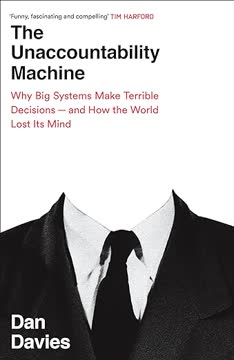
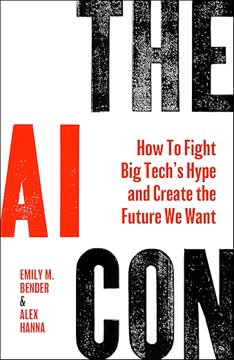
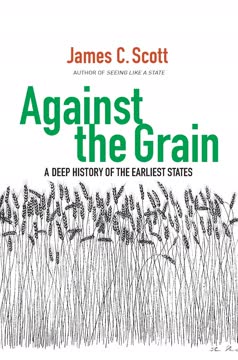
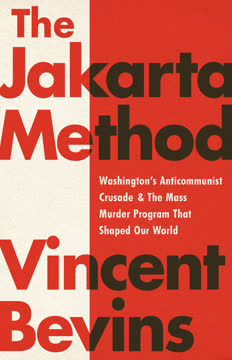
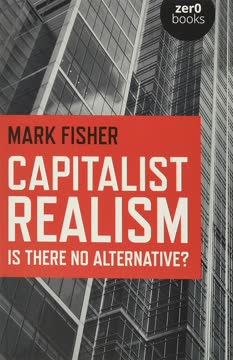
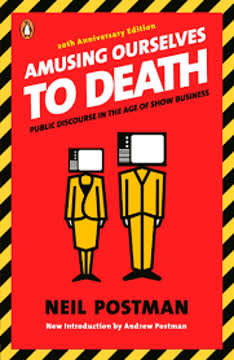
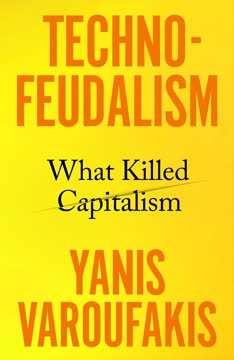
Download PDF
Download EPUB
.epub digital book format is ideal for reading ebooks on phones, tablets, and e-readers.
